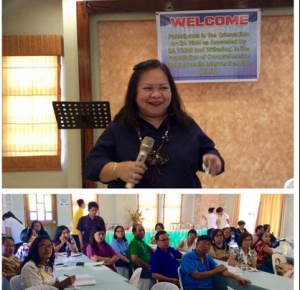
The transfer of Juvenile Justice and Welfare Council’s (JJWC) supervision from the Department of Justice (DOJ) to DSWD and the creation of the Regional Juvenile Justice and Welfare Council (RJJWC) as an attached agency of DSWD was warmly received by DSWD FO 02.
In one of the series of orientation on the revised Implementing Rules and Regulations of R.A. 10630, also known as an “Act Strengthening the Juvenile Justice System in the Philippines, amending for the purpose Republic Act 9344, otherwise known as the Juvenile Justice and Welfare Act of 2006,″ held throughout the region this July, Regional Director Remia T. Tapispisan accepted the challenge as its head.
“Hindi naman na bago sa amin sa DSWD ang mga programa at regulasyon na may kinalaman sa mga kabataan particular ang Children in Conflict with the Law (CICL) at Children at Risk (CAR) dahil sa nakalipas na mga taon, kami ay katuwang ng DOJ, iba pang ahensya ng gobyerno at pampubliko at pribadong organisasyon, sa pagpapatupad ng mga batas na nag-susulong ng kanilang kapakanan at karapatan,” Director Tapispisan said.
She likewise expressed that with the new provisions of the law, it can be assured that a better restorative juvenile justice system in the country is in the offing.
Among the notable salient features of the said revised rules is the creation of Bahay Pag-asa in cities or municipalities with high incidence of CICLs and CAR which seeks to provide a comprehensive and effective juvenile intervention program in order to reduce, if not address the involvement of children in crimes.
Bahay Pag-Asa is a 24-hour child caring institution established, funded and managed by local government units (LGUs) and licensed and/or accredited non-government organizations (NGOs) providing short-term residential care for children in conflict with the law who are above fifteen (15) but below eighteen (18) years of age who are awaiting court disposition of their cases or transfer to other agencies or jurisdiction.
“Ang mga CICLs at CAR ay biktima ng mga pangyayari at sitwasyong kanilang ginagalawan kaya hindi nararapat na sila ay bigyan ng marahas na parusa bagkus, sila ay may karapatang maituwid ang kanilang pamumuhay at maibalik sa kalinga ng kanilang pamilya at komunidad sa pamamagitan ng mga intervention programs katulad ng rehabilitasyon sa Bahay Pag-Asa,” Director Tapispisan added.
Likewise, partners from DOJ and Commission on Human Rights (CHR) set the record straight that erring children are not held liable for their actions as this is the prevalent misconception on the said law. Instead, the specific treatment, process and intervention program to be administered to children who committed a crime but cannot be criminally charged is made clear. This is to ensure that the children are made aware of their accountability.
Aside from RJJWC Secretariats, additional members of the RJJWC will be identified from the Department of Health and from the Leagues of Provinces, Cities, Municipalities and Barangays. Thus, strengthening coordination and convergence among stakeholders. ### By: GELA FLOR R. PEREZ, Regional Information Officer II

